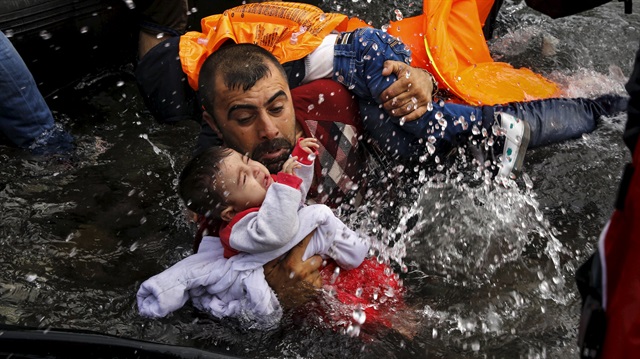
The ongoing refugee crisis in Europe, which may or may not be resolved with the deal between Turkey and the European Union, is a crisis of hypocrisy. As long as countries along the Balkan route (including Greece) acted as transit states for the refugees trying to reach the promised lands of Germany, Sweden, and elsewhere in Europe, no real solution was sought to ensure that the proper mechanisms were established to process those seeking refuge in Europe and to identify them properly vis-à-vis those entering as illegal immigrants from countries not at risk in an effort to ensure entry into the European Union. When the influx started becoming a deluge, especially after Angela Merkel's open door proclamation in August last year, and Germany was forced to reintroduce border controls along its border with Austria, the crisis grew and is fundamentally challenging the cohesion and future of the European Union itself. Individual EU member states or groups of states have been doing the same across the EU, while some have even proceeded with building fences to protect their external borders.
In the process, EU candidate states in the Balkans have also joined the fray while Turkey has used the situation to try to enhance its status and role with the EU in an attempt to become an indispensable actor, given the fact that most refugees and asylum seekers entered EU territory from Turkey via the Aegean Sea.
The crisis is manifold and complex, as it challenges the EU to come up with a plan of action that does not threaten its construct. Although one could say that the EU has always been forged in crisis as its leaders and EU institutions come up with solutions that keep the process of European integration on track, in this case the refugee crisis touched a number of nerves that complicate its resolution. It has acquired almost existentialist pretensions as many of the technicalities (policy areas and competences) and instruments needed to cope with it fall both under the purview of the European Community as well as the member states. This has been compounded by non- or slow compliance with agreements. The EU agreement to relocate over 98,000 refugees from Italy and Greece across the EU has hardly been heeded, while Turkey also resisted in implementing its Readmissions Agreement with the EU.
Yet, beyond the recriminations about which country has been doing its part to help resolve the issue, the fundamental concern is how it has played into the wider public sphere. This is particularly the case in the European Union where the last few years have witnessed a rise of populism and hate speech which is reflected in elections across the continent. As a result, exclusionist, far-right parties and anti-Islamic movements (such as Pegida) in Greece, Hungary, Slovakia, Germany, and elsewhere are gaining in strength by managing to be part of the political process at either national, regional, or local levels or all at once. In other words, the perennial fear of the 'other', the 'different', the 'alien' has become the very real headache with which Europe's political establishment and civil society at large have had to deal with. The emphasis on 'otherness' and why it should be avoided given the different cultural, linguistic, and religion backgrounds of the refugees challenges the concept of integration upon which modern European nations purportedly operate.
This is where work needs to be done. This is where the focus should be. The challenge is to integrate these differences and have them accepted by the silent majorities in each country. The challenge is to marginalize those that seek to further divide. The challenge for Europe is to believe that its motto - 'Unity in Diversity' - applies both in times of prosperity and peace as well as in times of crisis. Should Europe's leaders and its citizens not rise up to this challenge, it risks unravelling while taking with it all its neighbors that aspire one day to join its ranks because they believe in its values, and norms.
The refugee crisis may have become an existentialist one for Europe, but it also contains the opportunity for it to find itself again.
By- Dimitrios Triantaphyllou














